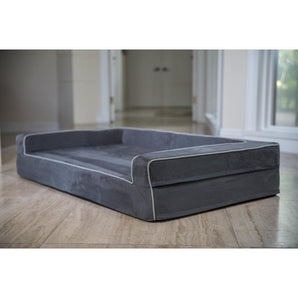If you’ve noticed your dog snoozing through most of the day, you might be wondering: why do dogs sleep so much? The short answer—most dogs sleep a lot because it’s completely normal! Most dogs need 12–14 hours of sleep every day, while puppies, senior dogs, and large breeds may need up to 18 hours.
But there’s a difference between normal rest and excessive sleep. If your dog suddenly starts sleeping much more than usual, or seems sluggish and hard to wake, it could signal an underlying health issue. We'll share what’s normal, what might be a cause for concern, and what pet parents can do to keep your dog’s sleep healthy and balanced.
Key Takeaways
-
Most dogs will sleep between 12–14 hours a day, while puppies and senior dogs need more.
-
Breed, age, weather, and activity level all influence your dog’s sleep schedule.
-
Too much sleep can signal health issues such as hypothyroidism, arthritis, or stress.
-
Quality sleep depends on diet, mental stimulation, exercise, and proper bedding.
-
If you notice a sudden change in your dog’s sleep habits, consult your vet.
Normal Dog Sleep Patterns

Just like humans, dogs go through various sleep cycles, including rapid eye movement (REM) and deep rest. During REM, your pup might twitch, whimper, or move their paws like they’re dreaming about chasing squirrels.
How much sleep is normal?
-
Puppies: 18–20 hours a day. Growing bodies and brains need extra rest.
-
Adult dogs: Around 12–14 hours of total sleep throughout the day and night.
-
Senior dogs: Often 16–18 hours a day due to slower metabolisms and lower energy levels.
Certain breeds also tend to sleep more. Larger breeds like Great Danes, Mastiffs, and Bully breeds often nap longer than smaller breeds or working dogs like Border Collies.
A general rule: if your dog’s sleep patterns fit within these ranges and they’re still active, eating well, and behaving normally when awake, there’s likely no reason to worry.
Of course, quality matters too. A supportive bed, like a Bully Bed orthopedic dog bed, helps your dog achieve deep, restorative rest by supporting joints and muscles, especially for larger breeds and older dogs.
Why Do Dogs Sleep So Much?
There are several non-medical reasons your dog may be clocking more nap time than usual.
1. Age and Life Stage
-
Young pups need extra rest for healthy development.
-
Adult dogs balance activity and downtime.
-
Older dogs may spend long stretches resting to recover energy and ease joint pain.
2. Breed and Size
Certain breeds naturally sleep more. Larger breeds have slower metabolisms and tire faster. Smaller breeds tend to stay awake longer and need less total sleep.
3. Weather and Environment
Many dogs will adjust their sleep schedule to the weather. Rainy days, colder months, or extreme heat can make even energetic dogs snooze more throughout the day.
4. Boredom or Lack of Stimulation
If your pup doesn’t have enough mental or physical activity, they may turn to napping to pass the time. Try:
-
Rotating puzzle toys or enrichment games.
-
Varying your walking routes.
-
Scheduling short, frequent play sessions.
5. Post-Activity Recovery
After a long walk, dog park visit, or intense playtime, dogs need extra rest to recharge. Just like athletes, their bodies recover best during sleep.
If your dog’s increased sleep lines up with these lifestyle factors, there’s usually no cause for concern.
When Excessive Sleep Can Indicate Health Issues
Sometimes, too much sleep points to an underlying health issue. It’s important to recognize the difference between normal rest and lethargy.
A dog that’s sleeping normally is easy to wake and will respond when you call their name. A lethargic dog, however, may be hard to rouse, move slowly, or seem uninterested in food or play.
Here are some common reasons dogs sleep too much:
1. Metabolic or Endocrine Problems
Conditions like hypothyroidism, diabetes, or anemia can cause fatigue and low energy levels. If your dog’s appetite or weight changes, talk to your vet.
2. Pain or Mobility Issues
Dogs with arthritis, hip dysplasia, or joint pain may rest more to avoid discomfort. Orthopedic support—like a Bully Bed orthopedic mattress or infrared dog bed—can relieve pressure points and encourage healthy, comfortable sleep.
3. Heart and Lung Conditions
Cardiovascular or respiratory problems make simple activities exhausting. Watch for panting, coughing, or reluctance to move.
4. Medication Side Effects
If your dog recently started a new prescription, check the label for possible drowsiness. Always ask your veterinarian before stopping or changing a medication.
5. Stress or Anxiety
Just like humans, dogs under stress may sleep more or less than usual. Anxiety can lead to disrupted sleep cycles, pacing at night, or long daytime naps.
If you notice a sudden change in your dog’s sleeping habits or any of these symptoms, schedule a vet visit right away.
Helping Your Dog Sleep Better

Supporting your dog’s health often means looking at their daily routine.
Here’s how you can help your furry friend maintain a healthy sleep pattern:
1. Evaluate Diet
Make sure their food provides the right nutrients and energy for their size, age, and activity level. A poor diet can lead to sluggishness or lots of sleeping.
2. Add Mental Stimulation
Mental exercise is just as important as physical activity. Try:
-
Interactive toys or treat puzzles
-
Short obedience sessions
-
Nose work or hide-and-seek games
3. Get the Right Amount of Exercise
Adjust your dog’s activity level to their age and breed. Puppies and high-energy breeds need more activity, while older dogs benefit from gentler walks and low-impact play.
4. Provide Comfort and Security
If your dog spends a lot of time resting, make sure their bed supports healthy posture and joint alignment. A high-quality orthopedic bed helps prevent stiffness and discomfort, especially for older dogs or large breeds.
For chewers or anxious pups, the Chew Proof Dog Bed can stand up to wear and tear while giving your dog a sense of security and comfort.
When to Call the Vet
You know your dog best. If something feels off, trust your instincts. Contact your veterinarian if you notice:
-
A sudden, significant increase in sleep (more than 50% over usual).
-
Lethargy or difficulty waking.
-
Loss of appetite or noticeable weight changes.
-
Panting, coughing, or labored breathing.
-
Signs of pain, such as limping or stiffness.
-
Any other sudden behavioral changes.
A vet exam can help rule out underlying health problems like metabolic disorders, infections, or anemia. It’s always better to check early than to wait until symptoms worsen.
FAQs About Dogs and Sleep
How much should my dog sleep each day?
Most adult dogs sleep 12–14 hours daily, but puppies and older dogs may need up to 18 hours. Larger breeds tend to rest longer than smaller ones.
Is it normal for my dog to sleep all day?
It can be normal, depending on your dog’s age, breed, and activity level. If they’re alert, eating, and behaving normally when awake, there’s usually no concern.
Why do older dogs sleep so much?
Senior dogs have slower metabolisms and may experience joint stiffness or lower energy levels. More sleep helps them recover and feel comfortable.
What if my dog suddenly starts sleeping more?
A sudden change in sleeping habits could indicate a health issue. Monitor for other symptoms and call your vet if your dog seems lethargic, uninterested in food, or shows other signs of illness.
Can anxiety cause dogs to sleep too much?
Yes. Dogs with anxiety or stress may sleep more to cope, or they may have disrupted rest. Providing structure, exercise, and a calm environment can help.
Can dogs get sleep apnea?
Yes, dogs can get sleep apnea, although it’s much less common than in humans. When it happens, it usually affects overweight dogs or short-nosed (brachycephalic) breeds like Bulldogs, Pugs, and Boston Terriers.
Does the type of bed affect a dog’s sleep quality?
Absolutely. A comfortable, orthopedic bed supports your dog’s joints, prevents stiffness, and improves deep rest. For large breeds or older dogs, this makes a big difference in daily comfort.
Keeep Your Dog Resting Comfortably
So, why do dogs sleep so much? In healthy dogs, it's completely normal. But keep an eye on your dog’s sleeping habits, energy levels, and behavior throughout the day. When in doubt, talk to your veterinarian and make sure your dog has a cozy place to rest—like a Bully Bed designed to support healthy sleep for every stage of life.





